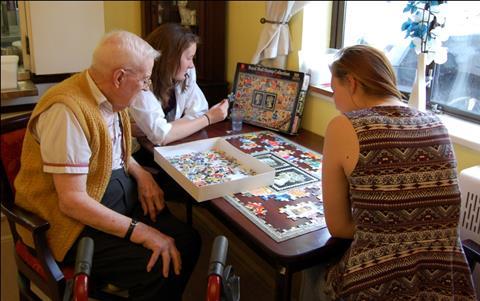Staff and patients must be clear on the benefits that volunteers can bring to the future of our health system, writes Sam Ward

The NHS long-term plan (published in January) recognised the importance of investing in volunteers for the future of the NHS. This prioritisation of scaling volunteering services and understanding of the value of volunteers will provide better outcomes for the NHS.
There are numerous examples of how volunteers add value to patient experience and hospital outcomes. The presence of welcome guides at the front desk can help improve “do not attend” rates, and evidence shows that patients who used the Royal Voluntary Service’s “Home from Hospital” Service in Leicester, a service assisting patients with their recovery, reported a 70 per cent improvement in social contact, and a 52 per cent improvement in confidence.
And volunteer support can impact on Care Quality Commission ratings - Dr Stephen Dunn, chief executive of West Suffolk Foundation Trust said he believed volunteers helped them improve their CQC rating from “good” to “outstanding”.
Volunteers clearly play a vital role in the future of the NHS, yet confusion still remains about the dividing line between the role of volunteers and NHS staff. Staff don’t know what to expect from volunteers, and a recent report from The King’s Fund revealed “the main challenge for frontline staff is a lack of clarity regarding role boundaries” suggesting the line between volunteer roles and staff needs to be clarified when integrating services.
Common confusions
There are a number of common confusions that continue to persist around where the line is between the roles. One of these is the idea that volunteers are brought in to make up for NHS shortfall or cuts, which is never the case.
By adding volunteers to any NHS environment you are increasing capacity for the rest of the hospital team to do what they are trained to do, rather than substituting volunteers for staff members. Volunteering is about doing all the jobs that fall out of staff remit, but improve the patient experience, encouraging recovery and better results which can make a real difference to patient’s mental and physical health.
In order to clarify the above, NHS staff must understand the scope, purpose and limits of volunteer roles. This means hospital staff feeling comfortable with volunteers – not only in traditional roles like trolley services – but also with newer, extended roles.
Volunteering is about doing all the jobs that fall out of staff remit, but improve the patient experience, encouraging recovery and better results which can make a real difference to patient’s mental and physical health
These roles see incredible results in terms of patient outcomes, and include volunteers assisting patients with exercise and offering mealtime assistance, encouraging hydration and nutrition and helping patients to feel like themselves and recover to the best of their ability. Getting patients out of bed, up, and dressed helps tackle risks and concerns around Pyjama Paralysis, and encouraging proper nutrition and hydration reduces chances of common infections like urinary tract infections.
Volunteers also help patients to settle back home, ensuring they can return to their day-to-day lives even if they are still recovering, which can reduce chances of them being readmitted to hospital unnecessarily. These are additional services helping patients, adding to staff services all year round, not only at points of pressure.
This is why volunteering and volunteer services are consistent and complimentary to hospital environments, and never a supplement for medical services.
Another common misconception is that volunteers are untrained. All volunteers should go through a rigorous application process.
Royal Voluntary Services’ process includes a face-to-face interview and references, following which they receive training in everything from basic confidentiality to specialist training for certain roles. Aside from the obvious, this has the benefit in that they have a very clear understanding of the limits of their own role, and where NHS staff need to be brought in.
Moreover, volunteers should never take on medical roles. Volunteers are not involved in personal care and if a patient needs additional support (either physically or psychologically) it is not the volunteer’s job.
This is why Royal Voluntary Service invests so heavily in training and establishing clear protocols about communications pathways in these situations. Safeguarding of patients is paramount and volunteers are trained to raise any concerns and pass it on appropriately, never to be involved beyond that. This means that volunteers can sign-post issues and improve resulting care.
Everyone in the sector will recognise that volunteering is changing, and has already changed significantly. Fifty years ago, Royal Voluntary Service was the Women’s Voluntary Services consisting mainly of female volunteers providing vital tea and comfort.
While still a pivotal service, the charity and many other NHS volunteering organisations consist of a diverse base of volunteers offering a range of services able to help build patient’s physical and mental strength, support their movement and return to mobility, and also their wider journey home, reducing readmission rates and saving NHS time and money in the process.
With such a significant shift, it is understandable that perceptions of volunteers must also change, and with that will come moments of confusion.
The line between the roles of NHS staff and volunteers needs to be articulated and defined so that staff and patients are clear on the benefits that volunteers can bring to the future of our health system. With a clearly defined role, volunteers can make the most of their time, giving and learning, and in this way benefitting themselves too.
It is vital that these definitions become ingrained in a hospital’s environment, which can be done by working with a volunteering partner that has done this for years, and has all of these processes already in place, ensuring the best outcomes for staff and patients alike.






























No comments yet